BYD Tang vs Toyota Proace Transporter – Differences & prices compared
Compare performance, boot space, consumption and price in one view.
Find out now: which car is the better choice for you – BYD Tang or Toyota Proace Transporter?
The BYD Tang (SUV) comes with a Electric engine and Automatic transmission. In comparison, the Toyota Proace Transporter (Cargo Van) features a Diesel or Electric engine with Manuel or Automatic transmission.
When it comes to boot capacity, the BYD Tang offers 235 L, while the Toyota Proace Transporter provides – depending on how much space you need. If you’re looking for more power, decide whether the 517 HP of the BYD Tang or the 144 HP of the Toyota Proace Transporter suits your needs better.
In terms of consumption, the values are 24 kWh per 100 km for the BYD Tang, and 23.80 kWh6.60 L for the Toyota Proace Transporter.
Price-wise, the BYD Tang starts at 59700 £, while the Toyota Proace Transporter is available from 31600 £. Compare all the details and find out which model fits your lifestyle best!
BYD Tang
The BYD Tang represents a bold entry into the competitive SUV market, blending cutting-edge technology with modern design aesthetics. Its spacious interior is complemented by high-quality materials and innovative features, making it a strong contender for families and tech enthusiasts alike. With an emphasis on sustainability, the Tang offers an eco-friendly driving experience without compromising on performance or luxury.
details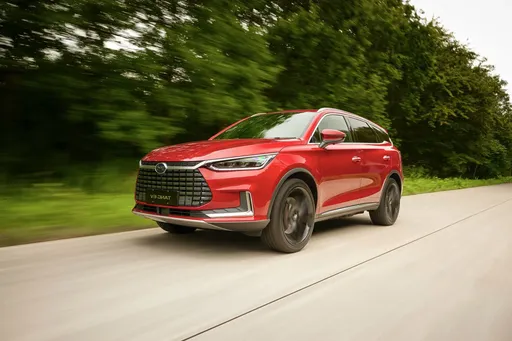 @ press.bydauto.be
@ press.bydauto.be
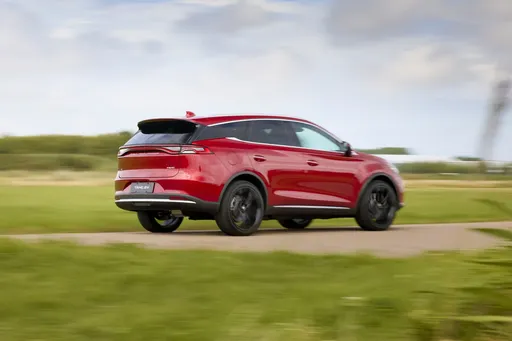 @ press.bydauto.be
@ press.bydauto.be
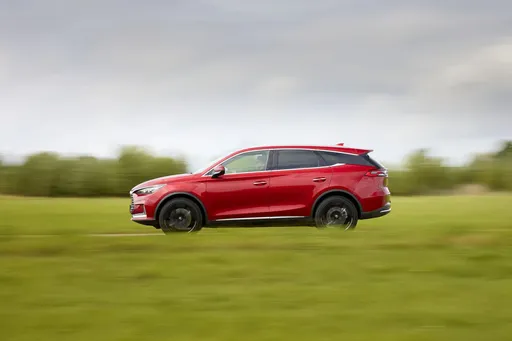 @ press.bydauto.be
@ press.bydauto.be
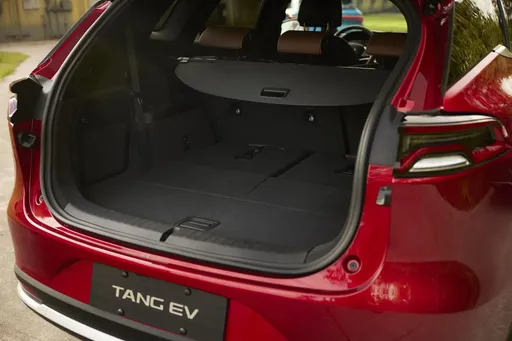 @ press.bydauto.be
@ press.bydauto.be
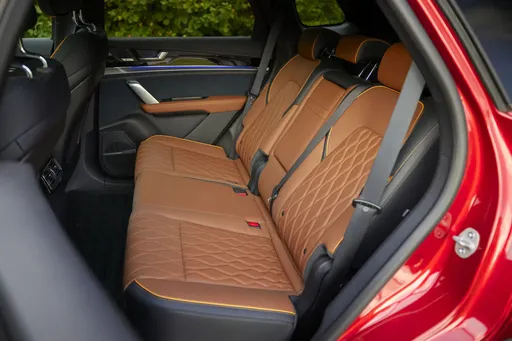 @ press.bydauto.be
@ press.bydauto.be
Toyota Proace Transporter
The Toyota Proace Transporter is a versatile vehicle designed to meet a variety of professional needs. With a focus on practicality, it offers a spacious interior and a flexible layout that can be adapted for both goods and passenger transport. Its efficient design and reliable performance make it a popular choice for businesses looking for a dependable workhorse.
details

|
|
|
|
|
Costs and Consumption |
|
|---|---|
|
Price
59700 £
|
Price
31600 - 45800 £
|
|
Consumption L/100km
-
|
Consumption L/100km
6.6 - 7.6 L
|
|
Consumption kWh/100km
24 kWh
|
Consumption kWh/100km
23.8 - 23.9 kWh
|
|
Electric Range
530 km
|
Electric Range
221 - 349 km
|
|
Battery Capacity
-
|
Battery Capacity
-
|
|
co2
0 g/km
|
co2
0 - 199 g/km
|
|
Fuel tank capacity
-
|
Fuel tank capacity
69 L
|
Dimensions and Body |
|
|---|---|
|
Body Type
SUV
|
Body Type
Cargo Van
|
|
Seats
7
|
Seats
3 - 6
|
|
Doors
5
|
Doors
4 - 5
|
|
Curb weight
2630 kg
|
Curb weight
1604 - 2100 kg
|
|
Trunk capacity
235 L
|
Trunk capacity
-
|
|
Length
4970 mm
|
Length
4980 - 5330 mm
|
|
Width
1955 mm
|
Width
1920 mm
|
|
Height
1745 mm
|
Height
1895 - 1935 mm
|
|
Payload
575 kg
|
Payload
955 - 1496 kg
|
Engine and Performance |
|
|---|---|
|
Engine Type
Electric
|
Engine Type
Diesel, Electric
|
|
Transmission
Automatic
|
Transmission
Manuel, Automatic
|
|
Transmission Detail
-
|
Transmission Detail
Manual Gearbox, Automatic Gearbox
|
|
Drive Type
All-Wheel Drive
|
Drive Type
Front-Wheel Drive
|
|
Power HP
517 HP
|
Power HP
120 - 144 HP
|
|
Acceleration 0-100km/h
4.90 s
|
Acceleration 0-100km/h
12.1 - 13.3 s
|
|
Max Speed
190 km/h
|
Max Speed
130 - 170 km/h
|
|
Torque
680 Nm
|
Torque
260 - 370 Nm
|
|
Number of Cylinders
-
|
Number of Cylinders
4
|
|
Power kW
380 kW
|
Power kW
88 - 106 kW
|
|
Engine capacity
-
|
Engine capacity
1499 - 1997 cm3
|
General |
|
|---|---|
|
Model Year
2024
|
Model Year
2024
|
|
CO2 Efficiency Class
A
|
CO2 Efficiency Class
F, A, G
|
|
Brand
BYD
|
Brand
Toyota
|
BYD Tang
Introducing the BYD Tang: A Leap into the Future
The BYD Tang marks a significant step forward in the automotive industry, blending innovative technology with an eco-friendly ethos. As a fully electric SUV, it represents a sophisticated fusion of power and efficiency.
Revolution in Power: Electrifying Performance
Under the bonnet of the BYD Tang lies a remarkable electric engine, boasting 517 PS (380 kW). This powerhouse delivers an astonishing torque of 680 Nm, enabling it to accelerate from 0 to 100 km/h in just 4.9 seconds. Such figures catapult the Tang into the upper echelons of electric vehicles, making it a thrilling option for those who seek performance without compromising on sustainability.
Efficiency Meets Range: A Sustainable Choice
The Tang’s prowess is not just about speed; it’s also about efficiency. Achieving a consumption rate of 24 kWh/100 km and offering a substantial electric range of 530 km, the BYD Tang ensures that drivers can travel far and wide with confidence. With an unparalleled range in its class, it’s a vehicle designed for both urban commuting and long-distance travel.
Innovative Design: Form Meets Functionality
The BYD Tang’s design does more than just catch the eye. With a length of 4970 mm, a width of 1955 mm, and a height of 1745 mm, it offers a commanding presence on the road. Despite its robust silhouette, the Tang is designed with aerodynamics in mind, ensuring minimal resistance and maximising its driving range.
Driving Comfort: Luxury Redefined
Inside the Tang, luxury is the standard. The spacious interior accommodates up to seven passengers, making it an ideal choice for families. Advanced technological features enhance the driving experience, ensuring comfort and connectivity on every journey.
Environmental Consciousness: Leading the Charge
The BYD Tang shines in terms of sustainability, boasting a CO2 efficiency class of A and producing 0 g/km of CO2 emissions. These credentials not only qualify it as an environmentally friendly option but also as a leader in the transition towards a greener future.
Conclusion: The Future is Electric
The BYD Tang embodies the future of automotive engineering—a future that is clean, efficient, and exciting. Priced at €69,615, it offers a compelling option for those who wish to embrace electric mobility without sacrificing the amenities and performance they’ve grown accustomed to. Whether for city driving or adventurous road trips, the Tang is poised to lead the charge.
Toyota Proace Transporter
The Toyota Proace: A Versatile Workhorse
The Toyota Proace Transporter shines as a reliable and versatile option for both businesses and individuals looking for a practical transport solution. With an array of models to choose from, Toyota caters to diverse needs, offering both diesel and electric powertrains.
Powertrain Options: Diesel Meets Electric
The Toyota Proace Transporter is available with diesel engines that range from 120 to 144 horsepower, as well as an electric version with 136 horsepower. The diesel engines are engineered to provide a balance of power and efficiency, with fuel consumption rates between 6.6 to 7.6 litres per 100km. For those interested in a sustainable choice, the electric variant offers an impressive range of up to 349 km on a full charge, with energy consumption between 23.8 to 23.9 kWh/100km.
Transmission and Drive Train Innovation
The Proace Transporter features manual and automatic transmissions, catering to different driving preferences. The front-wheel-drive system ensures stability and control, whether navigating urban environments or open roads. The diesel models come with either manual or automatic gearboxes, with the automatics offering a slightly more efficient fuel consumption at 7.5 litres per 100km.
Spacious and Functional Designs
With lengths ranging from 4980 mm to 5330 mm and a height between 1895 mm and 1935 mm, the Proace provides ample space for cargo or passenger transport. Its flexible seating options, accommodating between 3 to 6 occupants, makes it ideal for a range of commercial applications. Depending on the model, the maximum payload capacity extends up to 1496 kg.
Economic and Environmental Considerations
The Proace Transporter line-up offers a spectrum of CO2 emissions, from 173 g/km in the least efficient models to zero emissions in fully electric vans. The diverse range of CO2 efficiency classes—from F to A—ensures that buyers can select a model aligning with their ecological preferences.
Technological Advancements and Features
Toyota has equipped the Proace Transporter with various modern features across its trim levels, which include Comfort and Select options. Advanced technology and driver assistance features are integrated to enhance the driving experience, ensuring safety and convenience on the road. These include a precise navigation system, advanced braking systems, and optional driver assistance packages.
Conclusion: The Proace Promise
Overall, the Toyota Proace Transporter stands out for its combination of performance, innovation, and practicality. Whether opting for a fuel-efficient diesel or transitioning to a low-emission electric model, the Proace caters to a broad spectrum of needs, reinforcing Toyota's reputation for reliability and forward-thinking design. With a price range from €36,908 to €53,395, it's a compelling choice in the transport sector.
The prices and data displayed are estimates based on German list prices and may vary by country. This information is not legally binding.
